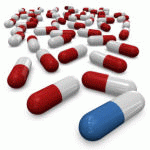Pharmacology
|
7 december 2019 13:04:46 |
| Marine Drugs, Vol. 17, Pages 690: In Vivo Hepatoprotective Effects of a Peptide Fraction from Krill Protein Hydrolysates against Alcohol-Induced Oxidative Damage (Marine Drugs) |
|
Tweet Background: Krill (Euphausia superba) represent the largest animal biomass on earth, and are a rich source of high-quality protein with essential amino acids. Krill-derived peptides are renowned for their antioxidant activities. Hence, these peptides may have protective effects against oxidative stress. Alcoholic liver disease is a prevalent cause of death worldwide. The present study explores the hepatoprotective effects of krill peptide hydrolysate fractions against ethanol-induced liver damage in BALB/c mice. Methods: Hydrolysis was carried out by mimicking the gastrointestinal digestion environment and the filtrate was fractionated based on molecular weight (<1 kDa, 1–3 kDa, and >3 kDa). The 1–3 kDa fraction (KPF), which indicated the highest antioxidant effect, was further investigated for its effect on weight and survival rate increase in mice and its influence on serum glutamic oxaloacetic transaminase, glutamic pyruvic transaminase, and liver cholesterol levels. Moreover, superoxide dismutase (SOD), catalase (CAT), and glutathione peroxidase (GPx) levels were measured, followed by Nrf2 and HO-1 expression. Histopathology studies were conducted to assess hepatic tissue damage. Results: KPF enhanced the weight and survival rate of mice while reducing serum glutamic oxaloacetic transaminase, glutamic pyruvic transaminase, and liver cholesterol levels. Moreover, KPF upregulated SOD, CAT, and GPx in liver tissues, while downregulating tumor necrosis factor α and interleukin-6 mRNA expression. KPF further increased Nrf2 and HO-1 expression and suppressed ethanol-induced apoptotic proteins in the liver. Histopathology of KPF-treated mice showed less hepatic tissue damage compared to ethanol-treated mice. Conclusions: Hydrolysates and bioactive peptides prepared from krill can be employed as functional foods to enhance liver function and health. Further investigations of KPF could lead to the development of functional foods. |
| 300 viewsCategory: Biochemistry, Molecular Biology, Pharmacology |
 Marine Drugs, Vol. 17, Pages 689: Innovative Green Technologies of Intensification for Valorization of Seafood and Their by-Products (Marine Drugs) Marine Drugs, Vol. 17, Pages 689: Innovative Green Technologies of Intensification for Valorization of Seafood and Their by-Products (Marine Drugs)Marine Drugs, Vol. 17, Pages 691: One-Step Preparative Separation of Phytosterols from Edible Brown Seaweed Sargassum horneri by High-Speed Countercurrent Chromatography (Marine Drugs) 
|
| blog comments powered by Disqus |
MyJournals.org
The latest issues of all your favorite science journals on one page
The latest issues of all your favorite science journals on one page



